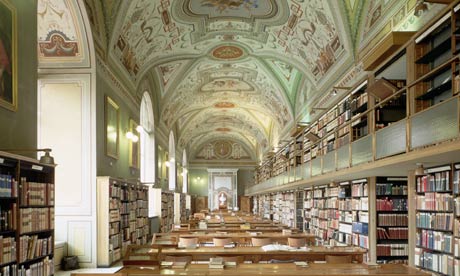NEW DELHI: In the days of the Raj, when the English aristocracy travelled to India in the 18th and 19th centuries, they would often occupy themselves with books during the long sea journeys that could last over a month. Bulky tomes with heavy subjects were, evidently, a popular option. Close to 8,000 such books, donated by the British travelers, are currently housed in a corner of Chandni Chowk at the Hardayal Municipal Public Library, among the oldest in the city.
Called the "rare books collection" they include a 1677 edition of Sir Walter Raleigh's History of the World and a Herodotus volume in the original Greek from 1826. But these books, like the library, are currently facing a threat. It has been four months since the library received salaries for its staff, let alone development funds. (See: 'We will have to shut down the newspaper section if we don't receive funds')
The rare books are kept under lock and key in iron vaults that are neither weather-proof, nor fire-proof. The pages of particularly brittle books are individually laminated. As for gaining access to a catalogue of these books, it necessarily involves a trek to Chandni Chowk and a classic cobwebs-in-your-hair procedure of going through physical records that will most certainly leave you with dusty fingers. The library is yet to see computerization.
Located close to the Chandni Chowk Police Station, the library has close to 1,200 members and gets about 700 visitors a day, library officials say. The library was instituted by the British in 1862, when it was called the Institute Library. In 1916 it was shifted to the current building and renamed Hardinge Municipal Public Library. It was only in 1970 that the "Hardinge" was replaced with "Hardayal". In December 1912, freedom fighter Lala Hardayalhad flung a bomb at Lord Hardinge's elephant procession. Ironically, the present building was built with contributions with influential Indian individuals and institutions of the time to commemorate Lord Hardinge's escape from that attack.
And then, even in the general stacks, history has a way of sneaking up on you. On a recent visit, TOI discovered a dust-laden, moth-eaten, yellowed copy of Mary Elizabeth Braddon's Ishmael. One of the last few pages bore the inscription "Printed for the Author By WilliamClowes & Sons Limited, London and Beccles". It is an 1884 author's edition.
The building, nearly a century old, preserves the tall arches, wooden spiral staircases and tall doors. A precarious, narrow iron staircase leads to the first floor that houses books in Hindi and English. Flooded with natural light during the day, you'd need to watch your step walking on the frail, creaky, plywood floor. British books on Indian and Roman history, or books in Hindi about homoeopathy, the library has most things covered in the 1,70,000 books it houses.
The reading rooms of the library underwent a renovation two years ago. Open to all from 8 am to 10 pm, it is particularly popular for its newspapers. During the day, it is invariably populated with young students consulting their books, punching away at their calculators and scribbling in their notebooks. "This is where I prepared for my M.A. and B.Ed exams. When I became a teacher, I would send my students here," says Yashpal Arya, the honorary secretary of the library. Currently it is difficult to say whether the library will survive. Even the various memos and letters submitted to government offices by the staff bear an ominous title enquiring for the "fate" of the library. There's hardly any going by the book right now.
'We will have to shut down the newspaper section if we don't receive funds'
It has been four months since the staff of the Hardayal Municipal Public Librarywas paid its salary. With the trifurcation of the MCD earlier this year, there was initially some confusion over the jurisdiction of this library with 31 branches across the city. The Chandni Chowk region, where the central library and the head office are, falls under the North Delhi Municipal Corporation. The official NDMC budget estimate lists "Grant-in-aid toHardayal Mpl. Public Library" as Rs. 3 crore for 2012-13.
Honorary Secretary of the library Yashpal Arya says he will have to shut down the newspapers section of the library by next month if he does not receive funds. The HMPL's newspapers section that subscribes to 31 newspapers from the English, Hindi and Urdu press, is gratis and open to all. "There are so many students who have done their PhDs from here. I only have hope until the end of August. I don't know how things will function beyond that," says Arya.
The library staff submitted a memo to Chief Minister Sheila Dixit on August 3 asking for release of provisional funds for salaries and other expenses. A copy of the memo, bearing the CM's handwritten note to NDMC commissioner PK Gupta is with the TOI.
"There are some audit problems. We are looking into it," said Gupta when last contacted. Meanwhile, the staff continues to scratch their wallets. "My son just joined college. I had to take a loan to submit his fees. It has been four months! How will we run our homes?" says a senior library official from Chandni Chowk.
Read More News at: Times of India
